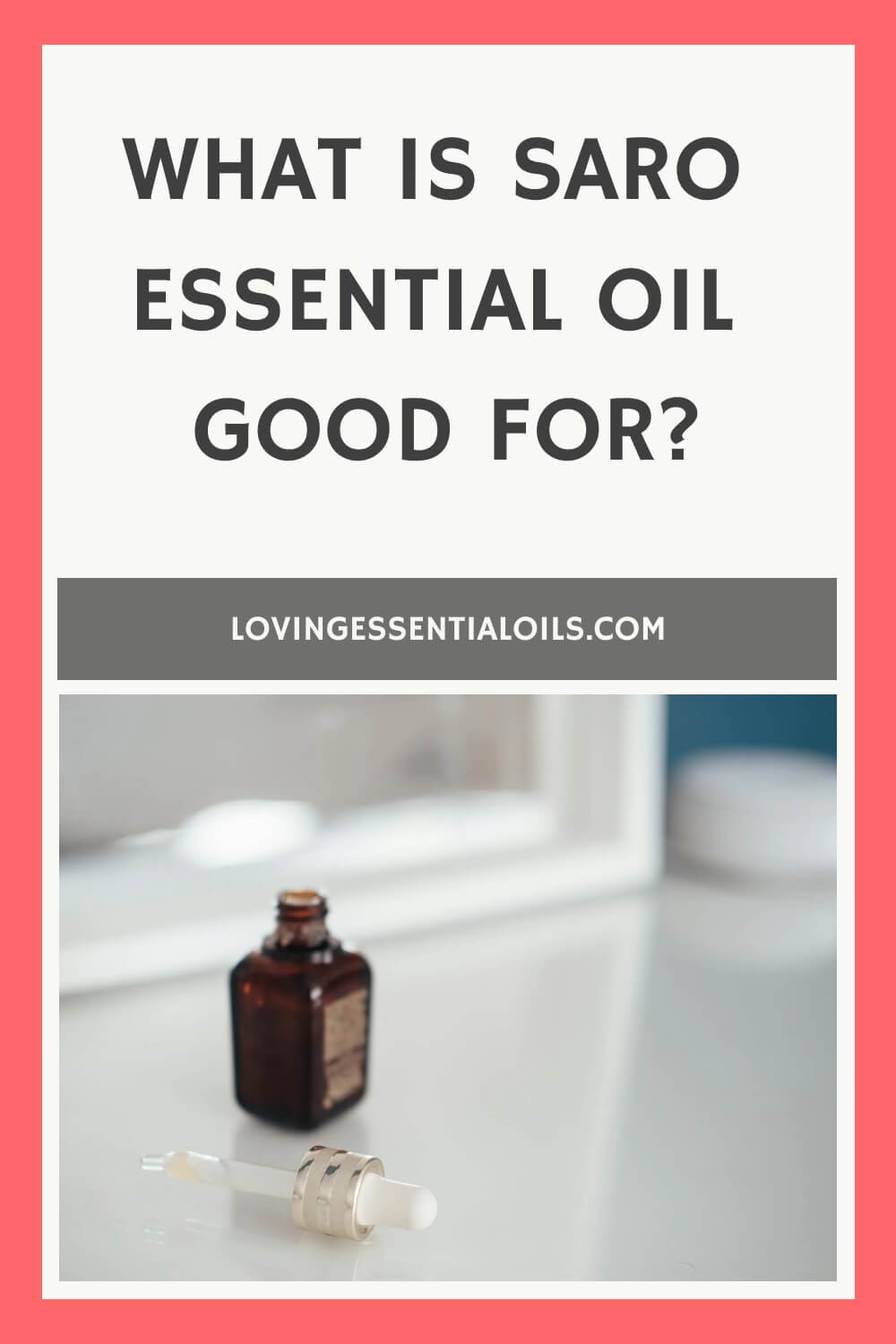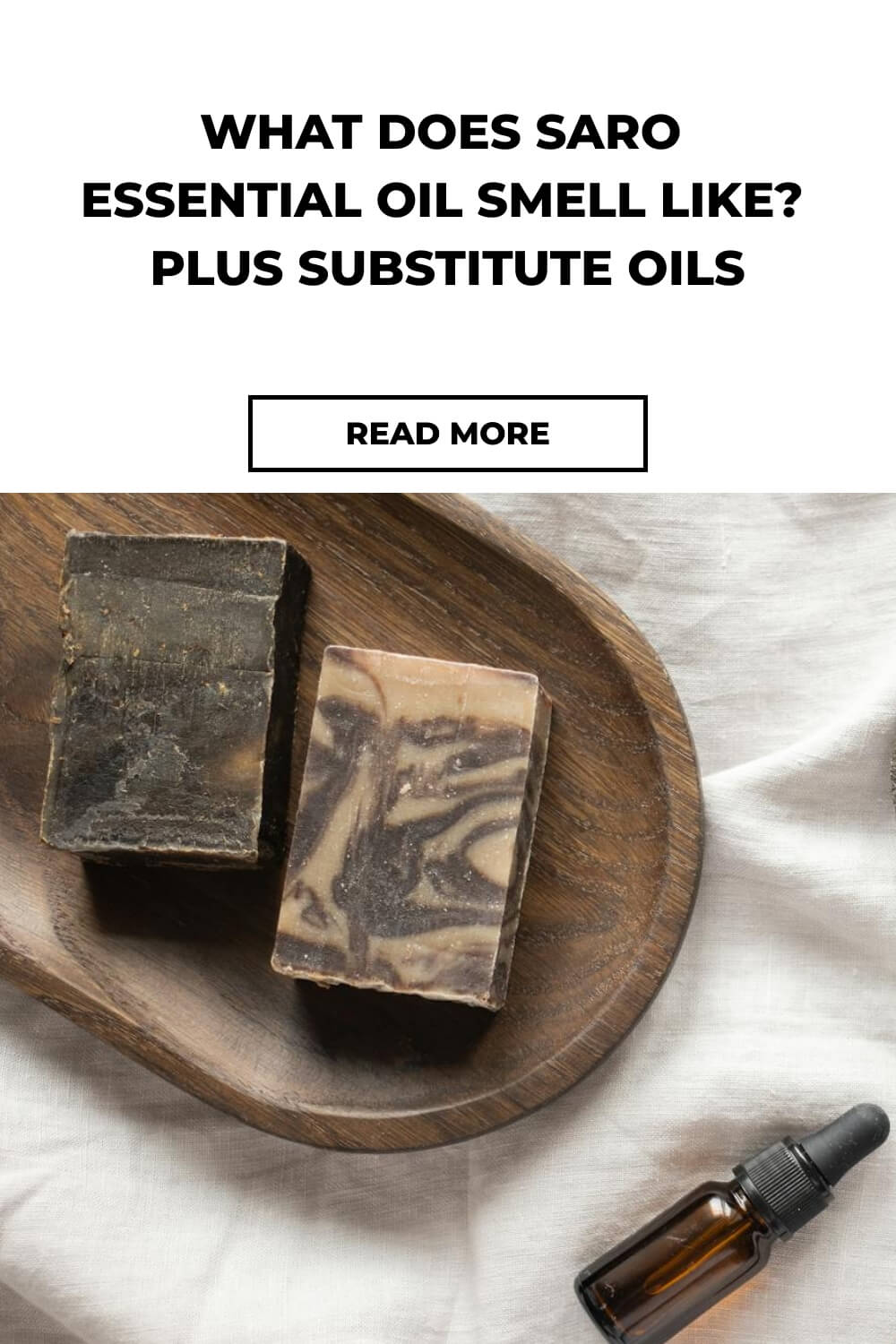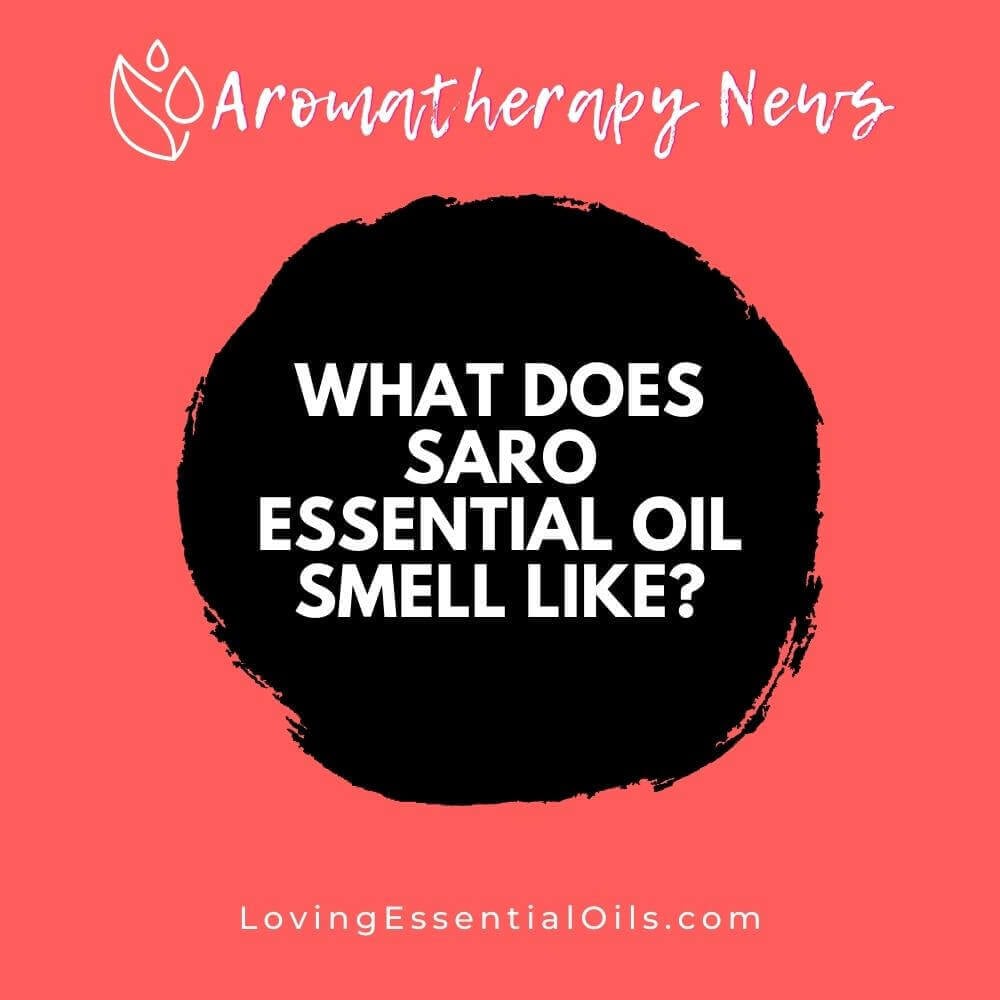If you are curious about saro oil, then you’re in the right place! In this blog post, we will explore what saro essential oil smells like, the benefits of using it, and how to use it safely.
When used in aromatherapy, saro essential oil can help restore emotional balance by elevating moods, as well as calming and soothing frazzled nerves.
Whether you choose to diffuse saro or apply it topically, its unique aroma is sure to please!
What is Saro Essential Oil Good for?
Saro essential oil is known for its soothing, calming effects, making it an excellent choice for stress relief and relaxation. Its antiseptic and antifungal properties make saro a great option to help with minor skin irritations and other skin issues.
Saro oil has also been used in aromatherapy to help soothe the mind and body by stimulating smell receptors in the nose. Its sweet aroma may alleviate depression, fatigue, headaches, and anxiety. Create Saro diffuser blends at home to enjoy these natural benefits.
High in sesquiterpenes, compounds that can suppress inflammation, saro oil has long been used as an analgesic to manage pain from arthritis and muscle spasms.
Saro Essential Oil Facts
- Botanical Name: Cinnamosma fragrans
- Family: Canellaceae
- Extraction Method: Steam Distilled
- Plant Part: Leaves
- Aroma: Energizing scent, similar to medicinal oils such as tea tree or eucalyptus with a hint of citrus
- Note: Top to Middle
- Safe for Kids: No
When blended with other essential oils like peppermint or lavender, saro’s effects are enhanced for better results.

What Does Saro Essential Oil Smell Like?
Saro essential oil, derived from the shrub Cinnamosma fragrans, has a unique scent that can be described as sweet and medicinal. It also has hints of lemon and delicate floral undertones, which gives it an uplifting aroma that is both calming and energizing at the same time.
Its alluring scent has been compared to medicinal scented oils like eucalyptus, though saro is sweeter and more floral, with notes citrus.
This makes it perfect for use in aromatherapy practices because its fragrance is both soothing and stimulating.
Saro Essential Oil Blends Well With
Saro oil has a distinct floral and medicial aroma, and it's often used in massage oils due to its calming effect. Additionally, saro blends well with many other essential oils to create custom aromatherapy mixes designed to relax the mind and body.
Specifically, saro blends nicely with citrus oils such as bergamot or grapefruit oil, making a beautiful fragrant mix that surrounds one in peace and relaxation. Alternatively, it works well with woody scents such as sandalwood or cypress essential oils for a more earthy feel.
- Basil
- Cypress
- Frankincense
- Ginger Root
- Lavender
- Lemon
- Niaouli
- Ravintsara
- Rosemary 1,8-Cineole
- Spearmint
- Sandalwood
- Plai
- Tea Tree
Regardless of which combination you choose, saro essential oil is sure to breathe life into any homemade essential oil blend.
Saro Essential Oil Benefits
Saro oil has a sweet, crisp depth that can both invigorate minds and relax bodies. In addition to its pleasant aroma, saro essential oil also offers a wide range of health benefits.
- It has antiseptic properties that can help protect against infections caused by bacteria or fungi.
- It also helps reduce inflammation and improve circulation, making it great for those who suffer from joint pain or other chronic conditions.
- Additionally, saro essential oil can aid in digestion and help strengthen the immune system.
- Diffuse or use with an essential oil inhaler to aid in respiratory support and open breathing.
- Can help to soothe skin irritations and sore muscles
Saro Essential Oil Emotional Benefits
Saro essential oil is quickly becoming one of the go-to natural solutions for eliminating feelings of stress, anxiety, and depression. With a distinct aroma, saro essential oil works to provide deep relaxation and help ease unpleasant emotions.
Just adding a few drops to your diffuser can provide long-lasting relief from mental exhaustion.
Many users have found it helpful for inspiring a sense of clarity in the mind and heart, thus allowing them to feel more balanced emotionally.
How to Use Saro Essential Oil Safely
When using any type of essential oil, it is important to use caution and safety measures to ensure that you do not cause any irritation or harm yourself or your environment.
With saro oil specifically, it should always be diluted with a carrier oil such as jojoba oil or coconut oil before being applied topically to the skin or inhaled through aromatherapy methods such as diffusing.
Additionally, do not ingest any type of essential oils unless otherwise directed by your doctor or healthcare professional!
Saro Essential Oil Substitute Options
Saro essential oil provides a unique scent and can be used for a variety of needs. However, for those who don't have access to Saro oil or prefer to use something else, there are many substitutes available. These substitutes can provide a similar benefits, and can help you still get the most out of essential oils.
Find out some of the best essential oil substitutes for saro, so you can find the right oil for you. With the right information, you can find the perfect essential oil to use for your own health needs.
1. Lavender essential oil
Lavender essential oil is one of the most popular essential oils out there, and for good reason. It has a calming and soothing aroma, and is great for reducing stress and anxiety. It’s also known to be an anti-inflammatory, anti-fungal, and antiseptic, so it can be used to treat skin conditions like acne.
Lavender oil is great for aromatherapy, and can be used in a diffuser or added to your bath water. It’s also commonly used in skincare products and massage oils.
2. Geranium essential oil
Geranium essential oil is a great substitute for Saro essential oil and is widely available. It has a sweet, floral aroma, similar to that of Saro oil, and is known to have calming, uplifting, and rejuvenating properties.
Geranium oil can be used to treat skin issues like acne, eczema and dermatitis, as well as reduce inflammation and promote the healing of wounds.
It can be used as a natural air freshener and bug repellent, and can even be diffused to help reduce stress and anxiety. Geranium essential oil is a very versatile oil and a great choice to have in your home.
3. Sandalwood essential oil
Sandalwood essential oil is a great alternative to the more rare and expensive Saro essential oil. Sandalwood is known to have a sweet, woody aroma and is widely used as an aromatherapy oil. It has a calming, soothing, and meditative effect and is widely known to be beneficial for the skin.
Sandalwood essential oil has antiseptic, antiinflammatory, and antispasmodic properties and is used to treat a variety of skin and respiratory conditions. It is also a great oil to use for meditation, yoga, and Ayurvedic treatments.
4. Clary sage essential oil
Clary sage essential oil is an excellent substitute for Saro essential oil. It has a sweet, slightly musky, and herbal aroma that provides both uplifting and calming sensations.
Clary sage essential oil is known for its ability to reduce stress, ease anxiety, and improve mood, making it a popular choice for aromatherapy. It is also said to help reduce cramps and menstrual pain, support clear and healthy skin, and even aid digestion.
Clary sage essential oil can be used in a diffuser, in massage oils, or even added to a bath. For an added benefit, mix clary sage essential oil with lavender oil for a relaxing effect.
5. Bergamot essential oil
Bergamot essential oil is a fantastic alternative to Saro essential oil. It has many of the same properties, including stress reduction and a calming effect. Bergamot oil is also useful in treating depression, fatigue, and skin conditions.
The oil has a distinct citrus-like aroma and can be blended with other essential oils to create a pleasant scent. It is ideal for diffusing and can be added to a carrier oil for massage or other topical applications.
Bergamot essential oil is generally safe to use and should be diluted before applying it to the skin.
6. Lemon Essential Oil
If you're seeking a natural way to boost your mental clarity and alertness then look no further than lemon oil. With its refreshing scent that invigorates the senses this essential oil is an excellent substitute for those who want more energy throughout their day.
Additionally, it has antiseptic properties which make it ideal for cleansing airborne bacteria from indoor spaces while also promoting relaxation by relieving stress and anxiety levels in users.
7. Rosemary Essential Oil
Rosemary essential oil has an invigorating herbal scent that has been shown to improve memory retention while also promoting healthy hair growth as well as soothing tired muscles after exercise or long periods of sitting down at work or school.
8. Peppermint Essential Oil
For those seeking a natural alternative to Saro essential oil, peppermint oil is an excellent choice. Its refreshing scent provides cooling relief while also offering benefits such as reducing muscle tension and promoting digestion.
Additionally, this stimulating oil can enhance focus and increase energy levels. With all these advantages its no wonder why so many people turn towards peppermint oil for their wellness needs.
9. Thyme Essential Oil
Thyme linalool oil is a powerful antimicrobial agent that can serve as an alternative to Saro essential oil. It has numerous applications such as supporting respiratory health fighting bacterial and fungal infections while also promoting immune wellness.
Thyme's herbal scent creates a calming atmosphere making it ideal for use during meditation or yoga practice. Its potency makes it worth considering when looking for natural remedies with proven efficacy against microbes.
10. Oregano Essential Oil
If you're looking for a replacement to Saro essential oil that packs just as much punch when it comes to fighting off infections and boosting immunity levels then oregano oil is definitely worth considering.
Use caution when using, this oil is considered a "hot essential oil" and can burn and irritate skin even when diluted with a carrier oil. My favorite way to use oregano oil is by diffusing. Do not ingest this essential oil.
Essential oils are powerful substances that require proper dilution and patch testing before use. Always follow recommended guidelines to ensure safety when using these products topically.
Final Thoughts on Saro Essential Oil Blends Well With
Saro essential oil has a unique scent that has an uplifting aroma that is both calming and energizing at the same time. In addition to its pleasant scent, it offers many health benefits such as protection from bacterial infections, improved circulation, relief from joint pain and inflammation, digestive support, and immunity-boosting properties – just to name a few!
If needed, there are a number of saro essential oil alternatives available, each with its own benefits and advantages. However when using any type of essential oils make sure to use caution and safety measures so that you do not cause any irritation or harm yourself or your environment. With proper care and usage techniques anyone can benefit from the healing powers of saro essential oil!






